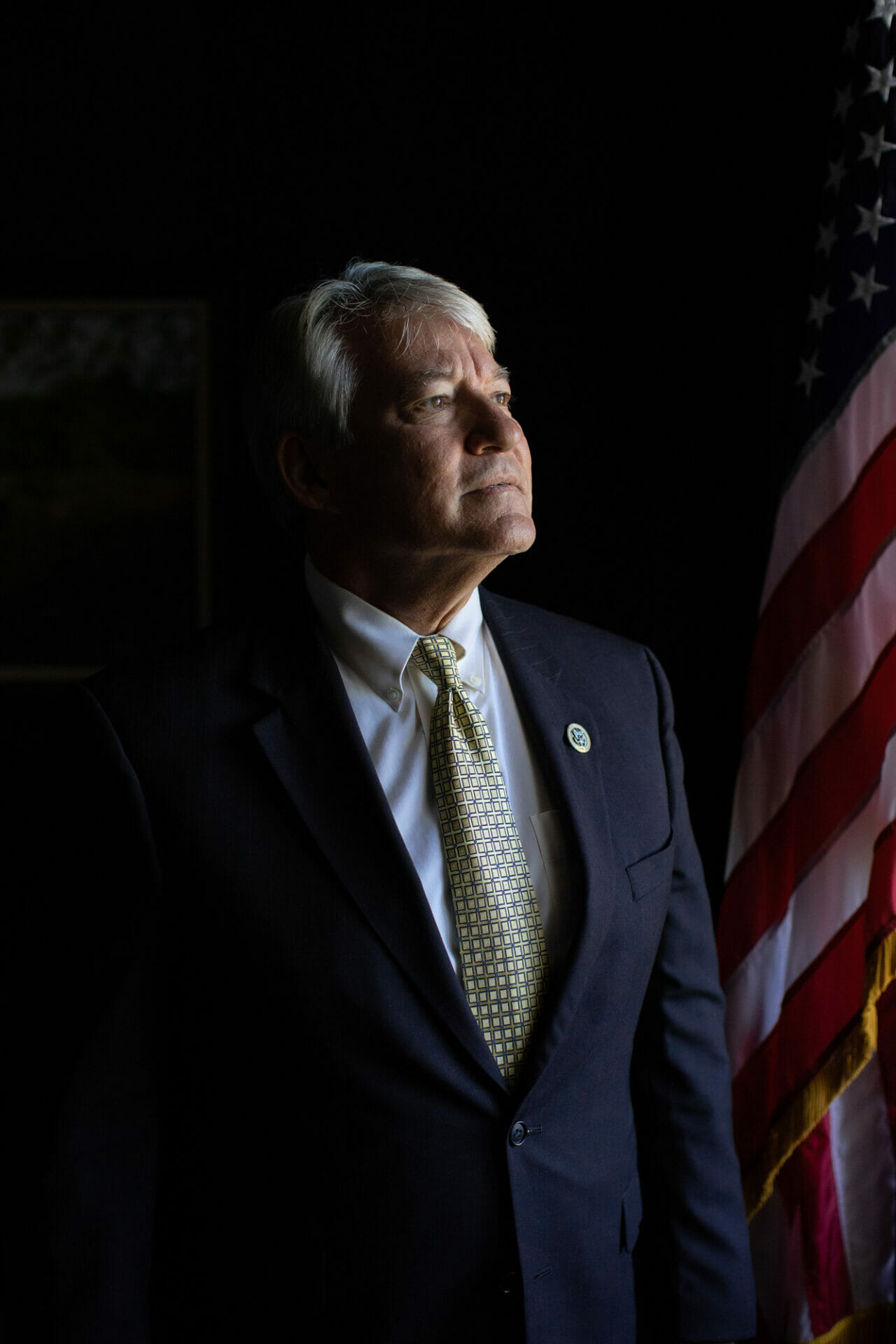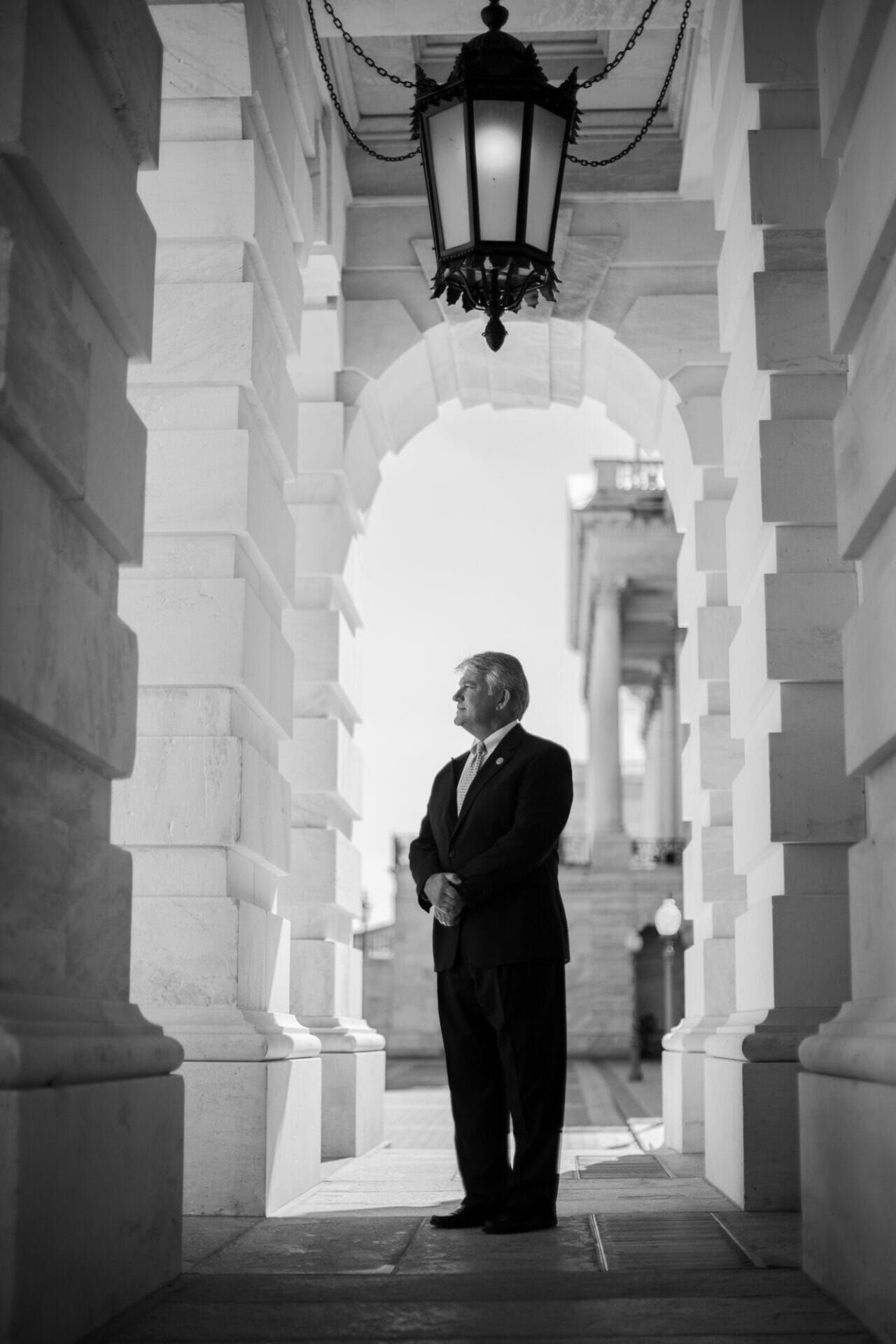Photography by Myles and Sarah Shank
Dennis Ross sold his law firm and headed to Washington, D.C., to represent his hometown and surrounding areas in Congress. Involved in politics since high school, he was looking forward to making a difference, to crossing the divide to work with members of other parties. As Congressman Dennis Ross heads home, he plans to continue to do the same.

He arrives in shorts, a shirt, and khaki boat shoes, his perfectly trimmed graying hair bobbing as he walks in, looking relaxed. He knows he has only two months left. And he’s grateful.
It’s not that he hasn’t enjoyed the last eight years, but times they are a-changing, and Washington, D.C. isn’t the same place it was when Dennis Ross first left Lakeland to serve as a member of the U.S. House of Representatives in 2011.
He’s deeply concerned about the lack of civility in the country today, a subject he’ll tackle as an educational leader in the next phase of his life (more on that later).
“The focus should always be to make sure due process is preserved. The sanctity of this country depends on that process,” he says. “That doesn’t always happen. The centralization of power in leadership has somewhat closed the door on that inclusion.”
Having announced in April that he would not seek re-election to a fifth two-year term, Ross has advice for his successor, Republican state Representative Ross Spano: “Be anchored to something such as your faith or your family, not to your politics. Politics is what we do; it should not be who we are. This job requires a lot of time away from the district. If you start feeling you’re a stranger in your own hometown, heed the warning and reacquaint yourself to the people who got you there.”
Ross has remained in touch with his community, returning here on weekends and breaks. When not working, he’s often seen walking through Peterson Park and lifting weights at the YMCA.
Cindy Ross says she’s ready to have Dennis back full time, although admits she will miss giving tours in Washington. In return, though, she will have time to reconnect with friends, pay attention to personal things, and develop her own corporate etiquette business. Together, the Rosses will do more entertaining at Heaven’s Gate, their 14-acre homestead.
“It will be nice to be back involved with the community, be a friend to my friends, and have the flexibility to travel and do the things we want to do,” she says. “Right now when we come home, we just want to be home. We’ll have eight, 10, 30 people over on Friday, Saturday, and Sunday nights. Dennis loves to cook and I love to entertain. Our rule is: You have to bring wine.”
“The focus should always be to make sure due process is preserved. The sanctity of this country depends on that process.”

Rooted in Lakeland
Dennis Alan Ross was born in Lakeland on October 18, 1959, to Bill and Loyola Ross, the youngest of their four sons and one daughter. He met Cindy Hartley at Lakeland High School.
“She was running for sophomore class secretary. I told her she should run for president. She said that was a guy’s job and said no. I said, ‘If you run for president, I will run your campaign.’ She won.”
They married on August 6, 1983, and he clearly considers her partnership as a reason for his success. “We’ve always had a foundation as a couple in the political process. She’s been the better half of the team and has been phenomenal in D.C. She truly is a first lady of the district.”
Cindy says she admired Dennis because he was a Christian, and their faith has grown through the last eight years.
“We both learned how to lean on God and to be more prayerful, to trust our faith, to expect an answer, and to expect that God will be there with us. It’s a lonely world out there in politics, and God has really been there for us,” she says. “That’s a change we’ve both gone through. To see him grow — and I know I have, too — but to see it in someone else is a really special experience.”
A special moment was when their pastor, Mike Loudon of First Presbyterian Church in Lakeland, performed the prayer to open session, Cindy says. “It was a real honor for us to get to have someone we truly love and admire do that.”
Ross is expected to be voted in as an elder at the church. As the couple prepares to live in South Lakeland permanently again, they are also helping plan a wedding. Oldest son Shane, who lives next door, is marrying Haley Murray in February. He and the Rosses’ youngest son, Travis, who lives with his parents, help manage the house and the dogs — the Rosses own Jack and Cider, 11-year-old Mastiff/lab rescue dogs.

FLORIDA HOUSE or U.S. House?
Ross was a member of the Florida House of Representatives from 2001 to 2009 before being term limited, then elected to Congress. So which level does he prefer?
“In the Florida House you get things done. It’s a 60-day session with a balanced budget requirement,” he says. “You got to a conclusion much quicker. [Issues] in the U.S. House perpetuate themselves.”
“They want to start a conservative think-tank and leadership program. We will do one-day leadership seminars that will instill a sense of responsibility and motivation to get involved in the process in a positive fashion. It’s not only an opportunity to teach the next generation, but to teach existing leaders how to reach across the aisle, to compromise.”
He admires Don Brown, a Florida House member from DeFuniak Springs, more than anyone, stemming from encounters when they held opposing views on high-speed rail. Then, in 2007, Ross and Brown were the only two representatives to vote against an expansion of Citizens Insurance in Florida. “He was a very principled person who taught me a lot. It’s OK if everyone doesn’t agree with you.” That landed both in the legislative doghouse, stripped of key positions. “Every elected official should endure something like that. It helps you build confidence in yourself.”
He’s continued working on insurance issues in Congress, especially trying to get government out of the flood insurance business. But he likes the things that hit home the most, like helping officials navigate the federal process so they could break ground on time, allowing Citrus Ridge Elementary — a civics-based school — to open on schedule. “That was amazing.”
There are also individual cases that have touched him, like helping get Korean War veteran Grady Halcomb the Distinguished Service Cross medal 65 years after he was a prisoner of war. “Being at the ceremony, watching the humility he exhibited,” Ross says, “you see the greater good in people when you see that.”

Ross credits his district staff with things like that. “Those are the silent ones you don’t read about.”
Shelee Meeker, who has worked with Ross for almost 22 years, starting as his paralegal at Ross Vecchio, says Ross and his staff have been able to help constituents navigate federal systems. “His district has always been his top priority.”
Ross continues to work toward goals not yet achieved, like filing a bill to decrease the debt and deficit. “We have to grow the economy. Once you pay those bills that are due, set aside some money to pay off the debt. It is one (issue) we’re not addressing, and it is what could be the silent killer of our country.”
Meeker says Ross hasn’t changed since he’s been in Congress. “He really hasn’t, well except for maybe his hair color,” she says with a smile. “The person I started working for all those years ago remains humble, generous, and kind. Those qualities are rooted in him.”
Cindy Ross agrees, saying his honesty and integrity make her proud — along with how smart he is. “He will stand up for things when someone else won’t. But he does it in a politically correct way; he considers how what he’s going to do might affect others, from his leadership to other members. He knows that some members can’t vote for a particular issue because of where they live; they would lose the next election or have a hard time with their constituents. He understands the process and the proper way to do it without hurting other people.”
Next Up?
Civics, civility, process, leadership — all will coalesce as Ross assumes his role as a teacher at Southeastern University, which is creating a center for civic engagement. The university offers a bachelor’s degree in political science and is considering offering a master’s degree.
“They want to start a conservative think-tank and leadership program. We will do one-day leadership seminars that will instill a sense of responsibility and motivation to get involved in the process in a positive fashion. It’s not only an opportunity to teach the next generation, but to teach existing leaders how to reach across the aisle, to compromise.”
“Be anchored to something such as your faith or your family, not to your politics. Politics is what we do; it should not be who we are. This job requires a lot of time away from the district. If you start feeling you’re a stranger In your own hometown, heed the warning and reacquaint yourself to the people who got you there.”

Ross says he advocates for less government; others have different views. “But we can resolve that and hopefully agree that we don’t want bad government. The pendulum is going to swing, and right now we are polarizing ourselves for every issue being the be-all, end-all.”
He’s looking forward to working with former state Senator Rick Dantzler, a Democrat. “We want to do some bipartisan issue advocacy. He gets it, too. This process of cooperation is lacking.”
Ross reflects on his childhood as an example of how tolerant people can be. “My mom was a lifelong Democrat and Dad a lifelong Republican. We joked that their votes would cancel each other out, but we never argued over the dinner table. The differences didn’t divide the family. It intrigued our family.”
Ross also plans to return to the practice of law. And the answer to the question everyone is asking? “I’m never going to say no to elected office again.”
